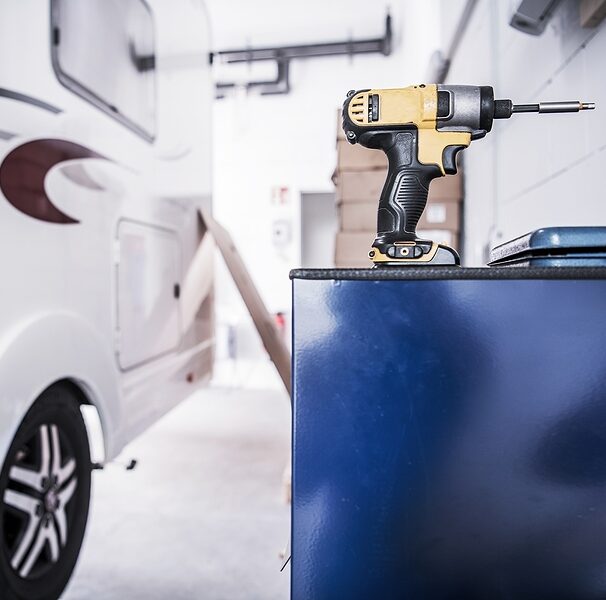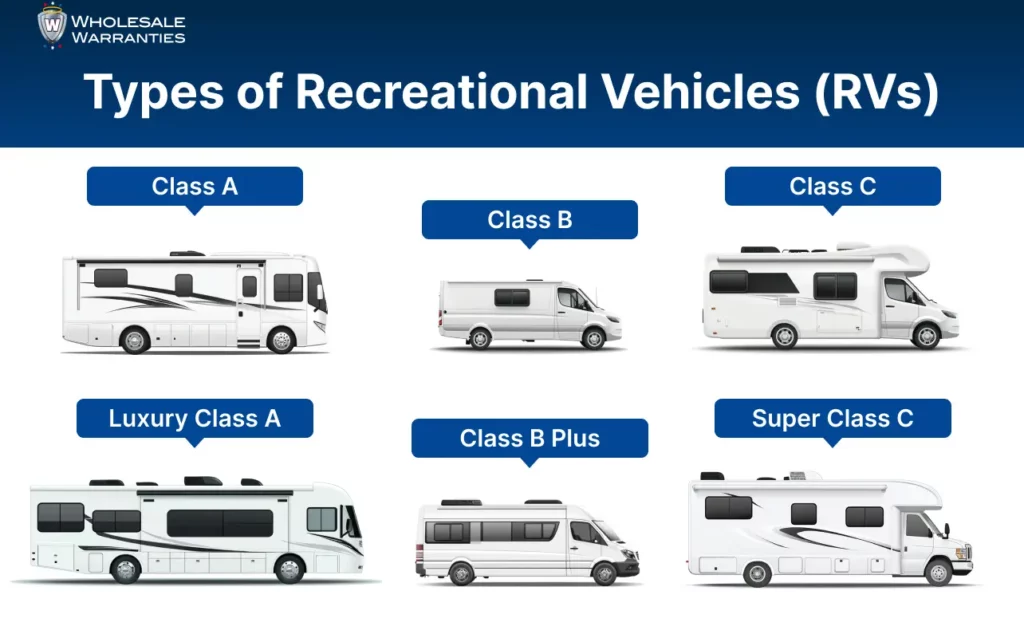Buying a Used RV
Our Guide to Purchasing a Used RV
Purchasing a used RV can be a great way to enter the community and get used to life on the road. If the goal is to get the most value out of your investment, you’ve come to the right place. We understand that most prospective RV buyers are purchasing used RVs, which have had previous lives largely unknown to the new owner. Therefore, it’s crucial to know what to look for in a used vehicle and learn how to secure used RV warranty protection, so you can enjoy your new-to-you rig with peace of mind.
Can I Buy a
Warranty for a Used RV?
We offer RV warranties for used RVs, with options for used motorhomes and towable trailers alike. Fill out our quote form to find out if you qualify.
The RV lifestyle is all about making cherished memories of life on the road. At Wholesale Warranties, we believe your well-loved rig is worthy of protection.
Sign up for our RV newsletter to stay in-the-know on all things RV:
By subscribing you agree to with our Privacy Policy
What to Look For in a Used RV
New or used, buying and owning an RV is a significant financial undertaking. Being selective helps ensure the vehicle you buy is in good working condition. Sometimes a used RV just needs a little bit of work, but be sure you know how much repair work you’re willing to take on in terms of both time and money. To aid in the research process, here are some things to look for when shopping for a used RV:
1. Check for Leaks
As many RV warranty customers can attest, a simple water leak can lead to significant damage in your motorhome or trailer. A minor leak has the potential to cause costly water damage and a major headache. To identify signs of water damage, look for mold, dampness, mildew smell, spongy surfaces, or delamination. Check the walls, roof, floor, vents, and underneath appliances. Although used RVs have a smaller price tag than new rigs, inheriting issues like water damage secondhand often is never worth it.
2. Inspect for Rust & Corrosion
Look for rust, corrosion, or other obvious signs of damage. Rust and corrosion weaken core vehicle components, increasing the likelihood of a breakdown and repair costs. Rust most frequently occurs in the RV undercarriage due to improper storage. Rust may be more prevalent in places with cold winters, as road salt can aid in accelerating the oxidization process. Excessive moisture can foster oxidization as well. Check the undercarriage for signs of rust.
3. Run Tests
Test the appliances, HVAC, plumbing system, and electrical system to take inventory of what is or is not functioning properly. Sometimes all it takes is a quick fix, but dysfunction may be caused by a larger issue or expose a history of neglect.
4. Review Vehicle History
Request maintenance records from the seller in order to review the vehicle’s history. Take note of any gaps or recurring issues. Verify that the RV has a clean title, is up to date on registration, and that the VIN matches all documentation. Using services like CarFax or Bumper can be helpful in finding a reliable rig.
5. Get an RV Inspection
The list of all the little things to look for is too long to include here, which is why it’s important to get a professional inspection before buying. An NRVIA-certified inspector will reveal hidden issues you and the seller or dealer might otherwise miss. A thorough RV inspection can provide you with a clean bill of health, or detailed diagnostic report, and peace of mind.
Some RV warranty providers, like Wholesale Warranties, include an RV inspection in the purchasing process. A professional can tell you with confidence whether the RV is in proper working order, and a warranty will prevent you from covering costs associated with future breakdowns.
6. Get an RV Warranty
When buying used, you need to know that almost every manufacturer warranty only applies for the first owner of the coach. Additionally, the manufacturer warranty typically expires by the time an owner is ready to sell. If your gently used rig breaks down after ownership changes hands, you are out of luck. Secure yourself against unexpected repair costs. When deciding whether to purchase an extended warranty, consider the following RV breakdown statistics:

Inspections & Extended Warranties for Used RVs
Inspections & Coverage
A reputable RV warranty provider will require an inspection to ensure that the vehicle is in good working condition before signing your contract. For example, Wholesale Warranties sends a licensed mechanic directly to your location for a pre-warranty inspection. Once the inspector provides a clean bill of health, your policy will go into effect without any waiting period.
The inspection process ensures that customers secure protection without any preexisting conditions and guarantees immediate coverage.
Benefits of a Used RV Extended Warranty
A used RV extended warranty offers protection against high repair costs. Older vehicles are more likely to suffer unexpected breakdowns, making it important to consider securing coverage. It is not too late to protect your home-on-wheels with an RV extended service contract. Wholesale Warranties offers used RV warranty options to provide peace of mind and financial protection against costly repairs.
Financing a Used RV
Private Sellers vs Dealers
There are two primary ways to buy a used RV: through a private seller or a dealership. Each option has its pros and cons, but in either case, you’ll need to decide how you prefer to pay for the purchase. Financing can be a good choice if you’d rather avoid paying the full amount upfront, allowing you to spread the cost into predictable monthly installments, on the condition of paying added interest.
For private-party purchases, you’ll need to secure financing in advance by applying for an RV loan. Keep in mind that loan terms and interest rates vary by lender and depend on factors such as credit history, income, and existing debt. If you’re buying from a dealer, financing is often available on-site at the time of sale. To ensure you’re getting the best rate, it’s advisable to research private loan options before visiting the dealership.
Should I finance an Extended Warranty?
As RV warranty experts, we advise against rolling an extended warranty into your RV financing plan. This approach adds unnecessary interest costs to a product your loan wasn’t meant to cover. Whereas dealers often present extended service contracts as convenient add-ons, third-party warranty providers typically offer flexible payment options of their own. Keeping your warranty separate also makes it easier to transfer or cancel your policy without being tied to loan payments.
To put it simply: don’t spend more than you have to.

Choosing the Right Used RV
When browsing for a used RV, consider which RV class will best suit your budget and lifestyle preferences. Whether you’re looking for a towable trailer or drivable motorhome, each class has something to offer. Keep in mind that when it comes to used motorhomes, mileage matters. To aid in your research, take a moment to review our complete visual guide to Class A, B, and C motorhomes.

Used RV FAQs
Can I get a warranty on a used RV?
The short answer is yes; you can purchase an extended RV warranty for a used motorhome or trailer! Dealers do not offer extended warranties for used RVs, but third-party companies do.
Is it a good idea to buy a used RV?
Most RV owners buy their RVs used! Brand new RVs are expensive and they depreciate more quickly. Plus, you can find more reviews and recalls for older models. If you have concerns about a used RV breaking down, consider getting a thorough RV inspection and securing extended warranty coverage.
Does an RV warranty transfer to the new owner?
Typically yes, but not automatically. Most extended warranty policies are transferable, given the vehicle is still eligible for coverage at the time of sale. There is a formal transfer process to be completed before the final sale, which typically requires a small fee and some paperwork. Warranties add resale value to an RV and allow the new owner to enjoy peace of mind.
Is an extended warranty worth it on used RV?
Older RVs are more likely to suffer unexpected breakdowns, increasing the value of an RV extended warranty.
